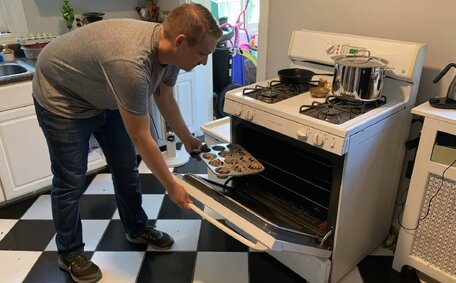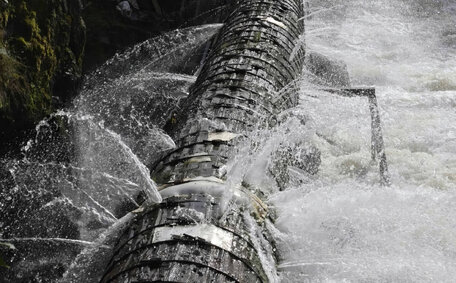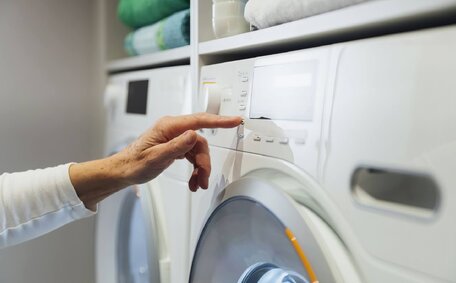Understanding Hard Water and Its Mineral Composition
Hard water contains high levels of calcium magnesium minerals, measured in grains per gallon (gpg). Calcium and magnesium levels, which cause hard water effects, are measured in grains per gallon (gpg). Levels above 7 gpg classify water as very hard.
In Australia, regions such as Erskine Park in Sydney have notable water hardness due to mineral leaching, which calls for more frequent cleaning of mineral deposits from pipes and appliances. Signs of hard water impact include scale buildup, stiff laundry, difficulty lathering soap, and dull hair and skin. The primary troublesome minerals in hard water are:
- Calcium - Can solidify into limescale and clog pipes
- Magnesium - Water containing this element soap scum can also result in buildup
- Iron - Causes staining and discoloured water
Testing the minerals your water contains in your home is key to understanding how hard water affects your plumbing and addressing issues through filtration and softening solutions. Our team can assess the effects of hard water on your plumbing and recommend solutions to boost flow and prevent damage.
How Scale Buildup Occurs
Scale buildup can occur when hard water travels through the pipes and fixtures, negatively affecting the water quality in your home. As hard water is heated or evaporates, the impact hard minerals such as calcium, magnesium, and others are left behind. Without intervention, hard water can form substantial mineral deposits over time, causing significant damage to appliances and surfaces due to rigid limescale formation.
This evaporation process is accelerated inside water heaters, washing machines, dishwashers and other appliances as hard water is repeatedly heated and cooled. It is essential to understand the process behind hard water’s contribution to rapid scale buildup, especially in hot water pipes.
Some key points about how scale buildup happens:
- Hard water leaves mineral residues when heated and evaporated in appliances
- Faster buildup inside your appliances where there is recurrent heating and cooling
- Limescale deposits reduce water flow through pipes
Limescale buildup as little as 3mm can lower water flow in pipes by up to 15%. Over time, unchecked scale can damage your plumbing appliances and plumbing system notably. The minerals also attract soap residue, oils and other gunk, worsening clogs.
Testing your water’s mineral levels is a crucial initial step to prevent scale formation. Water softener solutions can prevent the scale buildup and subsequent damage that might otherwise affect your plumbing.
Signs of Hard Water Buildup
There are several clear signs that indicate hard water buildup in your home’s plumbing:
- Declining water pressure can result as scale deposits constrict your pipes, restricting water flow over time. You may notice weaker pressure from faucets and showers.
- Spots on dishes and glassware - Hard water residues etch surfaces, leaving behind mineral films.
- Dull hair and skin - Hard water often results in limp hair and itchy, dry skin.
- Stiff, dingy laundry - Minerals bind with detergent making it less effective, resulting in dull, grey clothing.
- Cloudy ice cubes - Trapped minerals cause ice cubes to appear foggy.
- White chalky buildup around basins and showers can indicate possible scale-related clogging in your pipes, impeding water flow.
- Stained porcelain fixtures - Minerals can leave toilets, tubs and sinks with yellowish discolouration.
Regular descaling and use of fine mesh strainers help detect early mineral buildup from hard water. Testing your home’s water and installing the right filtration is key to mitigate impact hard water has on your system over time.
Clogged Drains and Pipes
Hard water mineral buildup is a common cause of clogged drains and reduced water flow in household plumbing systems. Accumulated scale deposits can constrict and eventually clog pipes, restricting water flow.
Some common signs of drain clogs and restricted water flow caused by hard water buildup include:
- Slow-draining sinks and your bathtub, often indicative of buildup
- Backed up sewer lines
- Toilets that struggle to flush properly
- Decreased flow from faucets and showerheads
- Noisy pipes and banging sounds
Minerals in hard water combine with soap scum, grease, hair products, and other residues to form thick deposits within drains and pipes of household appliances. This sludgy buildup may cause clogs and possibly pinhole leaks, obstructing water flow.
Installing water softeners or filters can help filter out minerals from your water supply before they have a chance to accumulate. We also recommend periodic drain treatments to clear deposits, along with snake augers for removing stubborn clogs caused by mineral scale or rust buildup from hard water damage.
Early detection of hard water problems is essential to take swift action and avoid expensive repairs for clogged drains. Our team specialises in drain cleaning services and can recommend solutions tailored to improving flow while preventing scale-related damages.
Corrosion and Damage to Plumbing Fixtures
The minerals in hard water can lead to corrosion and damage of plumbing fixtures like faucets, showerheads, and basin taps. As scale builds up it eats away at the metallic surface causing pitting and wear.
Your fixtures are exposed to high levels of calcium and magnesium in hard water, which accelerates their corrosion through galvanic processes. This causes materials like copper pipes and brass fittings to deteriorate faster.
Consider how signs of corrosion in your water system may indicate hard water damage, such as:
- Rust coloured staining on fixtures
- Pitting and roughness on faucets
- Mineral deposits around aeries and nozzles
- Leaky handles and sprayheads
Replacing corroded plumbing fixtures can be costly. Installing protective washers, insulating joints, and maintaining pH balance can help maximise lifespan. We recommend water softening solutions paired with periodic descaling to combat mineral damage over time.
Reducing Appliance Efficiency and Lifespan
Hard water negatively impacts the efficiency and lifespan of your water-using appliances like dishwashers, washing machines, and water heaters. Mineral scale from hard water build-up can impact hoses, heating coils, and pumps, reducing water flow and heat transfer.
This prolonged accumulation of hard water deposits can shorten the life your appliances are designed to have, as they are forced to run longer cycles to heat water properly and clean effectively. Continuous strain from hard water wears out washing machine components more rapidly, reducing the achievable lifespan of your appliances.
- Dishwashers and hot water heater units use more energy and salt, intensifying their use water to battle against mineral film and etching
- Your washing machines require extra rinse cycles to remove the clingy detergent residue
- Your hot water heater works harder to warm water, consuming more energy
We recommend installing water softeners or filters to remove scale-forming minerals before they enter your home’s pipes. Periodic descaling also helps reduce mineral buildup over time.
Taking preventative measures maximises efficiency, supporting your utility management by significantly reducing costs, and extends the operating life of dishwashers, washing machines and water heaters by years.
Increased Energy Usage
Hard water scale buildup causes appliances like dishwashers, washing machines, and water heaters to work harder and consume more energy over time. As mineral deposits accumulate inside hoses, heating coils, and pumps, it impedes water flow and reduces heat transfer.
Your dishwasher must work longer and use extra electricity to wash effectively against this resistance. The strain of fighting scale shortens the operating lifespan as well.
:
- Dishwashers may need an extra rinse cycle to remove film from dishes
- Washing machines need to use hotter water to break down detergent residues
- Water heaters operate non-stop to maintain the set temperature
Installing water softeners and filters prevents scale-causing minerals from entering your home’s pipes in the first place. We recommend solutions tailored to improving appliance function and energy efficiency.
Protecting Your Plumbing from Hard Water
There are several key steps homeowners can take to protect plumbing from hard water damage:
- Test your water - Understanding your water’s mineral composition is crucial for selecting the right filtration or softening solutions.
- Install water softeners or filters - These remove scale-forming minerals before they enter pipes.
- Use scale inhibitors - These chemicals help control mineral buildup inside pipes.
- Replace metal pipes with PEX or PVC - Plastic pipes resist corrosion better.
- Insulate hot water pipes - This slows down mineral deposit formation.
- Clean fixtures and flush pipes - Descale regularly to clear mineral residue.
Taking preventive measures is crucial, as they are the most effective way to sidestep costly hard water damage in the long term. Our team of licenced plumbers can assess your water quality and pipes to recommend custom solutions for protecting your plumbing.
Catching problems early also helps. Regularly check pipes and appliances for indicators of scaling or corrosion. Tiny leaks and restricted flow can balloon into pipe ruptures or appliance failure down the track.
We provide cost-effective water testing and premium softeners and filters to enhance water quality and maintain your plumbing’s longevity.
Installing a Water Softener
Water softeners use an ion exchange process to transform hard water into soft water, lowering the mineral content in your systems. Inside the softener resin tank, calcium and magnesium ions are exchanged with sodium or potassium ions, transforming the molecular structure of the water.
Key benefits of installing a water softener include:
- Ensures that softened water flows, preventing scale buildup inside pipes, fixtures, and appliances
- Allows soaps and detergents to lather and dissolve easier
- Leaves skin and hair feeling smoother after bathing and washing
- Extends lifespan of water heaters, washing machines and other appliances
- Saves money on cleaning and personal care products
Our licensed plumbers can assess your home’s water quality and suggest the most suitable water softener system for your household. We handle the full installation process, from pre-filtering to programming the digital head and connecting to drains.
Investing in a properly sized and installed water softener helps protect your plumbing for the long run while also improving your family’s comfort and quality of life through cleaner, softer water daily.
Reverse Osmosis and Water Filtration Systems
Reverse osmosis and water filtration systems are effective solutions for addressing issues with hard water. These systems use a multi-stage filtration process to remove up to 99% of minerals and other contaminants.
Key benefits of reverse osmosis and water filtration for hard water include:
- Mitigates scale accumulation in pipes, fixtures, and appliances
- Removes minerals that cause stains and residue
- Improves efficiency of appliances like dishwashers
- Provides cleaner, better-tasting drinking water
- Extends lifespan of water heaters and other equipment
Our team can install a high-quality water system, either under-sink or whole-house, designed specifically to treat hard water. We select the right filter membranes and stages to target problem minerals like calcium and magnesium.
Reverse osmosis excels at removing salts and metals while carbon filtration handles other impurities. Used together, these two technologies can transform even very hard water into cleaner, softer water throughout your home.
Upgrading to a properly designed and sized filtration system is a smart way to prevent scale damage while enjoying purer water for bathing, cleaning and drinking.
Regular Maintenance to Remove Scale Buildup
Regular maintenance is crucial for managing how hard water plumbing contributes to scale buildup inside pipes, fixtures, and appliances. Simple steps like periodic descaling are essential to mitigating what hard water buildup can do to your plumbing over time.
Descaling involves flushing pipes and equipment with a dissolving solution to loosen scale deposits. Vinegar, citric acid, or commercial descaling agents break down calcium carbonate and mineral residues.
To prevent scale, we recommend descaling:
- Water heaters should be descaled every 3 months
- Washing machines and dishwashers twice a year
- Faucets and showerheads quarterly
- Whole house piping annually
In addition to descaling, inspect washers, aerators, and valves to detect and address scale buildup promptly. Replacing old steel pipes with PEX or PVC also reduces corrosion over time.
Routine descaling and maintenance prevent mineral clogging from developing into substantial blockages, leaks, or appliance failures. The small effort helps safeguard pipes and equipment by restoring full pressure and flow.
When to Call a Professional Plumber
There are a few key times when it’s wise to call in a professional plumber to assess your hard water issues:
- You notice a significant drop in water pressure throughout your home’s pipes
- Faucets or showerheads have very little flow despite descaling
- Persistent leaks, damages or stains caused hard water mineral accumulation
- Your water heater, washing machine or dishwasher seem to strain or work overtime
- You need guidance selecting the right water softener or filter system
- To install or repair a water softening or filtration system
- For yearly water quality assessments and plumbing inspections
Our licensed plumbers are extensively trained and experienced in resolving a broad range of plumbing issues, specifically those resulting from hard water damage. We offer affordable water testing, repairs, as well as installation and maintenance of water softeners and filtration systems.
For proficient assistance with hard water concerns, please reach our team today at 1300 349 338 or via email at [email protected].






